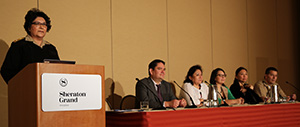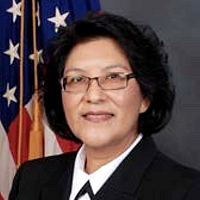Nearly 150 Indian Health Service (IHS) staff working in different areas of the Indian Self-Determination and Education Assistance Act (ISDEAA) Title I and Title V activities, and the Indian Health Care Improvement Act (IHCIA) Title V Urban Indian health activities, gathered last week in Phoenix, Arizona for the internal IHS Federal Staff Training and Meeting. All 12 IHS Areas were represented.
An important priority at IHS is to renew and strengthen our partnerships with Tribes, Tribal organizations and Urban Indian health programs. An integral part of that partnership is to implement the ISDEAA through Title I Self-Determination and Title V Self-Governance activities. This can be accomplished through the government’s responsibility to provide health services to eligible American Indians and Alaska Natives, whether the Tribe chooses to receive services directly or under ISDEAA authorities.

The first two days of the gathering focused on training existing and newly assigned staff to ISDEAA or Urban teams on the laws, regulations, agency policies and practices in carrying out activities with Tribes, Tribal organizations or Urban Indian health programs. The last two days focused on identifying and discussing issues related to ISDEAA Title I and Title V, and the IHCIA Title V Urban Indian health programs.
The successful government-to-government relationship with Tribes has assisted in the Agency’s improvement in delivering health care over the past few decades. Challenges are apparent, but the skilled IHS staff at Headquarters and in the Areas are equipped with resources to carry out these important activities. This meeting reinforces that work and commitment to providing the most effective and efficient health programs for Tribes, Tribal organization and Urban Indian health programs.
The IHS Tribal Self-Governance Program includes the participation of 352 of the 567 federally recognized Tribes that have negotiated 88 compacts and 113 funding agreements under the authority of Title V of the ISDEAA. This represents the annual transfer of over one-third of the total IHS appropriation to federally recognized American Indian and Alaska Native Tribes to operate and manage health care programs, services, functions or activities previously provided by IHS.
It is evident that many Tribes, Tribal organization and Urban Indian health programs benefit from the programs under the ISDEAA and IHCIA. The IHS staff’s understanding of program operations is critical to ensuring that patients in the Indian health care system have access to quality care.
RADM Sandra Pattea, a member of the Fort McDowell Yavapai Nation and a descendent of the Hopi Tribe, is the Deputy Director for Intergovernmental Affairs for the Indian Health Service. RADM Pattea, a nurse officer in the Commissioned Corps of the U.S. Public Health Service with over 32 years of active duty, advises the IHS Principal Deputy Director and provides oversight on Tribal and Urban Indian health activities within the Office of the Director.



